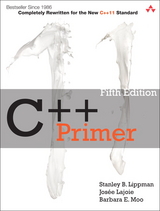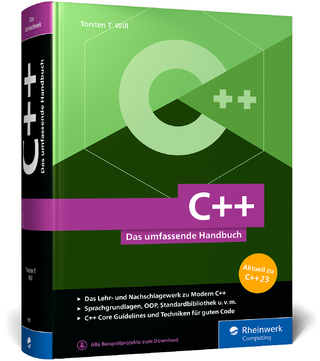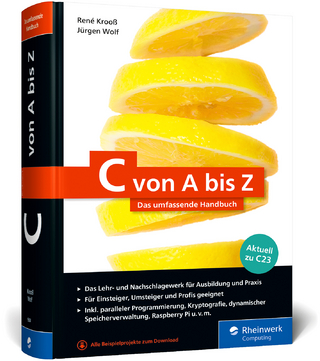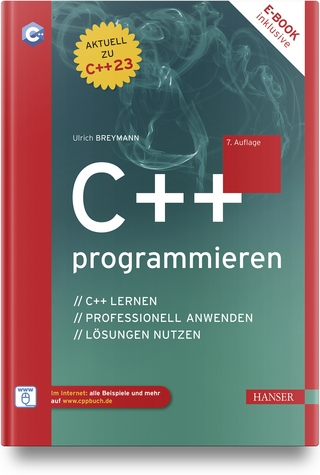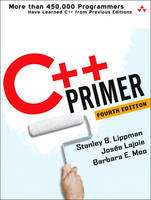
C++ Primer
Addison Wesley (Verlag)
978-0-201-72148-5 (ISBN)
- Titel erscheint in neuer Auflage
- Artikel merken
"C++ Primer is well known as one of the best books for learning C++ and is useful for C++ programmers of all skill levels. This Fourth Edition not only keeps this tradition alive, it actually improves on it."
--Steve Vinoski, Chief Engineer, Product Innovation, IONA Technologies
"The Primer really brings this large and complex language down to size."
--Justin Shaw, Senior Member of Technical Staff, Electronic Programs Division, The Aerospace Corporation
"It not only gets novices up and running early, but gets them to do so using good programming practices."
--Nevin ":-)" Liber, Senior Principal Engineer (C++ developer since 1988)
This popular tutorial introduction to standard C++ has been completely updated, reorganized, and rewritten to help programmers learn the language faster and use it in a more modern, effective way.
Just as C++ has evolved since the last edition, so has the authors' approach to teaching it. They now introduce the C++ standard library from the beginning, giving readers the means to write useful programs without first having to master every language detail. Highlighting today's best practices, they show how to write programs that are safe, can be built quickly, and yet offer outstanding performance. Examples that take advantage of the library, and explain the features of C++, also show how to make the best use of the language. As in its previous editions, the book's authoritative discussion of fundamental C++ concepts and techniques makes it a valuable resource even for more experienced programmers.
Program Faster and More Effectively with This Rewritten Classic
Restructured for quicker learning, using the C++ standard library
Updated to teach the most current programming styles and program design techniques
Filled with new learning aids that emphasize important points, warn about common pitfalls, suggest good programming practices, and provide general usage tips
Complete with exercises that reinforce skills learned
Authoritative and comprehensive in its coverage
The source code for the book's extended examples is available on the Web at the address below.
www.awprofessional.com/cpp_primer
Stanley B. Lippman is Architect with the Visual C++ development team at Microsoft. Previously, he served as a Distinguished Consultant at the Jet Propulsion Laboratories (JPL). Stan spent more than twelve years at Bell Laboratories, where he worked with Bjarne Stroustrup on the original C++ implementation and the Foundation research project. After Bell Laboratories, Stan worked at Disney Feature Animation, originally as principal software engineer, then as software technical director on Fantasia 2000. Josée Lajoie is a staff development analyst in the IBM Canada Laboratory C/C++ Compiler group, and is currently the chair of the core language working group for the ANSI/ISO C++ Standard Committee. In addition, she is a regular columnist on the evolution of the C++ Language Standard for the C++ Report.. Barbara E. Moo is an independent consultant with 20 years' experience in the software field. During her nearly 15 years at AT&T, she worked on one of the first commercial products ever written in C++, managed the company's first C++ compiler project, and directed the development of AT&T's award-winning WorldNet Internet service business. 0201721481AB01312005
Preface xixChapter 1. Getting Started 11.1 Writing a Simple C++ Program 2 1.2 A First Look at Input/Output 5 1.3 A Word About Comments 10 1.4 Control Structures 11 1.5 Introducing Classes 20 1.6 The C++ Program 25 Chapter Summary 28 Defined Terms 28 Part I. The Basics 31Chapter 2. Variables and Basic Types 33 2.1 Primitive Built-in Types 34 2.2 Literal Constants 37 2.3 Variables 43 2.4 const Qualifier 56 2.5 References 58 2.6 Typedef Names 61 2.7 Enumerations 62 2.8 Class Types 63 2.9 Writing Our Own Header Files 67 Chapter Summary 73 Defined Terms 73Chapter 3. Library Types 77 3.1 Namespace using Declarations 78 3.2 Library string Type 80 3.3 Library vector Type 90 3.4 Introducing Iterators 95 3.4.1 Iterator Arithmetic 100 3.5 Library bitset Type 101 Chapter Summary 107 Defined Terms 107 Chapter 4. Arrays and Pointers 1094.1 Arrays 110 4.2 Introducing Pointers 114 4.3 C-Style Character Strings 130 4.4 Multidimensioned Arrays 141 Chapter Summary 145 Defined Terms 145 Chapter 5. Expressions 147 5.1 Arithmetic Operators 149 5.2 Relational and Logical Operators 152 5.3 The Bitwise Operators 154 5.4 Assignment Operators 159 5.5 Increment and Decrement Operators 162 5.6 The Arrow Operator 164 5.7 The Conditional Operator 165 5.8 The size of Operator 167 5.9 Comma Operator 168 5.10 Evaluating Compound Expressions 168 5.11 The new and delete Expressions 174 5.12 Type Conversions 178 Chapter Summary 188 Defined Terms 188 Chapter 6. Statements 191 6.1 Simple Statements 192 6.2 Declaration Statements 193 6.3 Compound Statements (Blocks) 193 6.4 Statement Scope 194 6.5 The if Statement 195 6.5.1 The if Statement else Branch 197 6.6 The switch Statement 199 6.7 The whileStatement 204 6.8 The for Loop Statement 207 6.9 The do while Statement 210 6.10 The break Statement 212 6.11 The continue Statement 214 6.12 The goto Statement 214 6.13 try Blocks and Exception Handling 215 6.13.1 A throw Expression 216 6.13.2 The try Block 217 6.13.3 Standard Exceptions 219 6.14 Using the Preprocessor for Debugging 220 Chapter Summary 223 Defined Terms 223 Chapter 7. Functions 225 7.1 Defining a Function 226 7.2 Argument Passing 229 7.3 The return Statement 245 7.4 Function Declarations 251 7.5 Local Objects 254 7.6 Inline Functions 256 7.7 ClassMemberFunctions 258 7.8 Overloaded Functions 265 7.9 Pointers to Functions 276 Chapter Summary 280 Defined Terms 280Chapter 8. The IO Library 283 8.1 An Object-Oriented Library 284 8.2 Condition States 287 8.3 Managing the Output Buffer 290 8.4 File Input and Output 293 8.5 String Streams 299 Chapter Summary 302 Defined Terms 302Part II. Containers and Algorithms 303Chapter 9. Sequential Containers 3059.1 Defining a Sequential Container 307 9.2 Iterators andIteratorRanges 311 9.3 Sequence Container Operations 316 9.4 How a vector Grows 330 9.5 Deciding Which Container to Use 333 9.6 strings Revisited 335 9.7 Container Adaptors 348 Chapter Summary 353 Defined Terms 353Chapter 10. Associative Containers 35510.1 Preliminaries: the pair Type 356 10.2 Associative Containers 358 10.3 The map Type 360 10.4 The set Type 372 10.5 The multimap and multiset Types 375 10.6 Using Containers: Text-Query Program 379 Chapter Summary 388 Defined Terms 388 Chapter 11. Generic Algorithms 39111.1 Overview 392 11.2 A First Look at the Algorithms 395 11.3 Revisiting Iterators 405 11.4 Structure of Generic Algorithms 419 11.5 Container-Specific Algorithms 421 Chapter Summary 424 Defined Terms 424Part III. Classes and Data Abstraction 427Chapter 12. Classes 42912.1 Class Definitions and Declarations 430 12.2 The Implicit this Pointer 440 12.3 Class Scope 444 12.4 Constructors 451 12.5 Friends 465 12.6 static Class Members 467 Chapter Summary 473 Defined Terms 473 Chapter 13 Copy Control 47513.1 The Copy Constructor 476 13.2 The Assignment Operator 482 13.3 The Destructor 484 13.4 A Message-Handling Example 486 13.5 Managing Pointer Members 492 Chapter Summary 502 Defined Terms 502Chapter 14. Overloaded Operations and Conversions 50514.1 Defining an Overloaded Operator 506 14.2 Input andOutputOperators 513 14.3 Arithmetic and Relational Operators 517 14.4 Assignment Operators 520 14.5 Subscript Operator 522 14.6 Member Access Operators 523 14.7 Increment and Decrement Operators 526 14.8 Call Operator and Function Objects 530 14.9 Conversions and Class Types 535 Chapter Summary . 552 Defined Terms 552Part IV. Object-Oriented and Generic Programming 555Chapter 15. Object-Oriented Programming 55715.1 OOP: An Overview 558 15.2 Defining Base and Derived Classes 560 15.3 Conversions and Inheritance 577 15.4 Constructors and Copy Control 580 15.5 Class Scope under Inheritance 590 15.6 Pure Virtual Functions 595 15.7 Containers and Inheritance 597 15.8 Handle Classes and Inheritance 598 15.9 Text Queries Revisited 607 Chapter Summary 621 Defined Terms 621Chapter 16. Templates and Generic Programming 62316.1 Template Definitions 624 16.2 Instantiation 636 16.3 Template Compilation Models 643 16.4 Class Template Members 647 16.5 A Generic Handle Class 666 16.6 Template Specializations 671 16.7 Overloading and Function Templates 679 Chapter Summary 683 Defined Terms 683Part V. Advanced Topics 685Chapter 17. Tools for Large Programs 68717.1 Exception Handling 688 17.2 Namespaces 712 17.3 Multiple and Virtual Inheritance 731 Chapter Summary 748 Defined Terms 748Chapter 18. Specialized Tools and Techniques 75318.1 Optimizing Memory Allocation 754 18.2 Run-Time Type Identification 772 18.3 Pointer to Class Member 780 18.4 Nested Classes 786 18.5 Union: A Space-Saving Class 792 18.6 Local Classes 796 18.7 Inherently Nonportable Features 797 Chapter Summary 805 Defined Terms 805Appendix A. The Library 809A.1 Library Names and Headers 810 A.2 A Brief Tour of the Algorithms 811 A.3 The IO Library Revisited 825Index 843
| Erscheint lt. Verlag | 24.2.2005 |
|---|---|
| Verlagsort | Boston |
| Sprache | englisch |
| Maße | 234 x 181 mm |
| Gewicht | 1442 g |
| Themenwelt | Informatik ► Programmiersprachen / -werkzeuge ► C / C++ |
| ISBN-10 | 0-201-72148-1 / 0201721481 |
| ISBN-13 | 978-0-201-72148-5 / 9780201721485 |
| Zustand | Neuware |
| Informationen gemäß Produktsicherheitsverordnung (GPSR) | |
| Haben Sie eine Frage zum Produkt? |
aus dem Bereich
